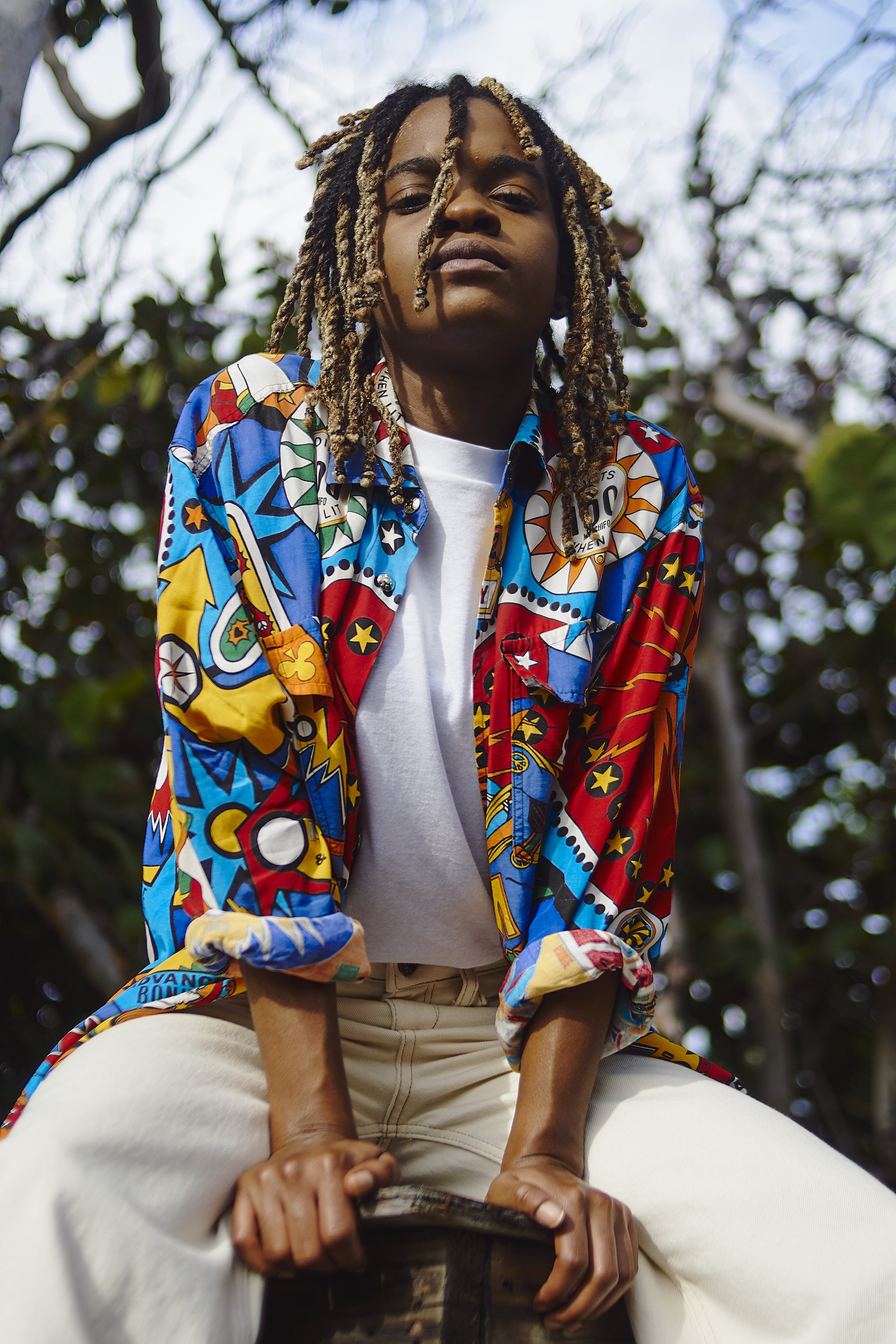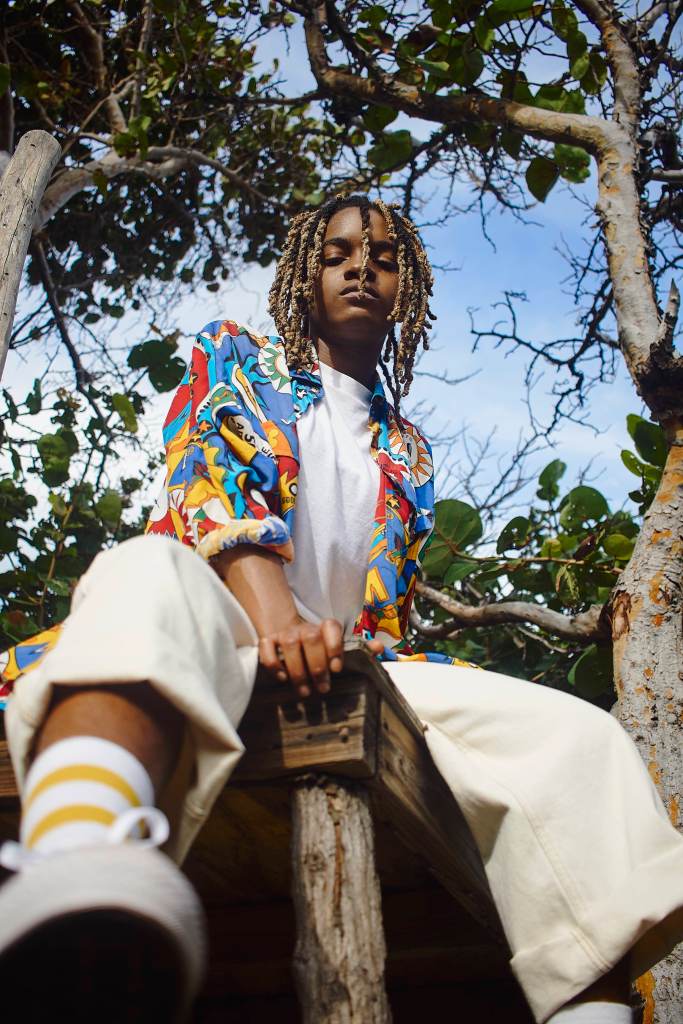Koffee was at home, in Spanish Town in Jamaica, when she found out she’d been handed an accolade about 4,600 miles away. In January, the 19-year-old reggae artist, who flips between mellow rap bars and bold, throaty singing, was named as one of the 15 artists on BBC Radio 1Xtra’s Hot List. Joining the likes of rappers Octavian and slowthai, R&B artist Amber Mark and jazz-influenced soul artist Tiana Major9, the black music radio station highlighted Koffee as an act you’d be better off paying attention to in 2019. “I was like, what?” she says to me later, as we meet in south London. “I’d only been to the UK once before, so it’s amazing.”
In fairness, so are a lot of her career milestones thus far. Koffee’s put out five singles since 2017, with her debut Rapture EP due out at the end of this week, but she’s already managed to leap beyond Jamaica’s borders to international attention. Granted, her record deal with Columbia helps, but she started out unsigned, she says, working with her team on getting her music heard. The graft paid off. A few years after first writing songs as an adolescent, she’d earned co-signs from reggae acts she idolises, including legend Cocoa Tea and new-wave stars Chronixx and Protoje. By 17, she’d shared a stage with Cocoa Tea at Jamaica’s Rebel Salute event in January 2018 and featured in a 1Xtra live Chronixx performance a month later. All this at an age when most of us would be out looking for our first shags and discarding the last vestiges of childhood. In a way, as she says, music felt like a viable option after the disappointment of not being accepted to sixth form. “At the time I thought, ‘if it’s not going to be school then it’s definitely going to be music.’” And that’s that on that.
Videos by VICE
She tells me all of this in Brixton market, on the sort of late January afternoon where the cold sinks into the fabric of your jeans and beds in on your thighs. About a month before her 19th birthday we’re huddled under blankets at the south London Caribbean food mainstay, Fish, Wings ‘n Tings, talking about how she’s established a particularly positive, inspiring voice. Well, I’m doing most of the talking. Koffee, who barely clears 5 foot 2, calmly waits for me to finish each sentence, taking her time with her responses. As I ask an ice-breaker question of sorts, about the 1Xtra show she played the night before, she begins with: “Okay, before that, it is a pleasure to meet you and thank you for what you said before. The gig was really good, the audience was receptive.” And soon she’s talking about how lovely it was to work with her guitarist. She wraps up: “give thanks for 1Xtra and the UK people for putting me in a position to be a part of the plot for 2019.”
It’s almost disarming to meet a teen musician like her, who juggles sounding both childlike and wise beyond her years. She oozes a sense of gratitude that would seem cloying if it were disingenuous, but after spending time in her company, warming myself eating fritters still hissing from the fryer, I feel as though this is who she truly is. Koffee’s modest, and hardly showing signs of being plucked from relative obscurity via a school talent show to signing a major label deal three years later. But don’t take her quiet confidence for naivety: she’s perceptive, and clearly happy in her own company. “I’ve always been a kind of person who kept to themselves,” she tells me at one point, in her deep and measured voice. “I have siblings but they’re all much older than me and they were all abroad when I was raised.” And so, a lot of the values both her music and character exude – patience, humility, pride – radiated off her mother. We talk about both being raised by single mothers, and the stamp it left on our lives. “I learned basically everything from her. My mum’s always been a grateful person, a considerate, philosophical kind of person who just tries to do the best. I think I got all of that from her.”
On the upcoming Rapture EP, that comes across on tracks like past single “Throne,” where she raps “Jamaican people, leave the violence / Cyan read, well read between the lines!” in a bid to provide an alternative to kiss-kiss-bang-bang motifs in the genre today. “Ragamuffin,” where her rap flow kicks into its highest gear, features the line “Mi only spit lyrics, nuh really talk a lot.” And so it functions as an introduction to how she might be mouthy on the mic, but more reserved in person. She’s a natural people-watcher, and you can hear that thoughtfulness in her lyrics. In person, I notice it in how often she says the word “vibe” without sounding unpretentious. Few can pull that off, for sure.
Noisey: When did you know you wanted to do music?
Koffee: I was raised in the Seventh-Day Adventist Church so I grew up around music a lot, singing harmonies and stuff like that, and I found myself loving it at a very early age. When I was about 14, I started actually writing lyrics and listening to reggae and practising my craft as a lyricist.
What was it like writing your breakout single “Toast”?
I was actually in Haiti for the first time, looking at the hills from my hotel. And [Major Lazer’s] Walshy Fire sent me a set of beats – “Toast” was one of them. He worked on it with Izzy Beatz and I was listening to it and thinking about my journey before entering the music industry: what led me to enter the music industry, what it’s been like since I entered the music industry. Just feeling very appreciative, and giving thanks for what’s happened and people who have been there for me. I felt melodic, and so on, and the beat just got me with the inspiration.
What’s it been like processing being signed to a big international label like Columbia?
It definitely does feel different – I’d be lying if I said it doesn’t. When Columbia approached me and we worked things out, everything felt different, full-on. Our plans definitely had to get bigger, more elaborate. The details became more intricate, and now I can really feel and see the progress.
This might sound weird, but you’re so calm to be around. Would your friends or extended family describe you as a calm person?
Yeah, but I can actually be a pretty fun and energetic person, haha – if it’s the right time. Before shows I’m just in my zone but outside of that yeah, I think so. They know I can be fun and calm at the same time. I’m a person who always tries to remember, when interacting with other people, that I’m interacting with another human and whatever energy I give off is going to affect the situation or the conversation or whatever it is. So I try to remind myself of that.
Some people in the entertainment industry lose a sense of that…
It can be very easy to, but I was raised that way so it’s not very easy for me. That’s the thing about not meditating, in more than the ‘omm’ cliche way. Sometimes you have to refresh. You have to reflect on what happened throughout the day at the end of it, so you can learn from your experiences, mistakes. Being 18 years old, I learn every day. It’s just about paying attention to your interactions reflecting what you see.

That really comes through in your music. You seem to be giving young people another narrative in reggae.
I think that God definitely steered my path this way. When I first started writing lyrics, they were typical. Like, I was a teenager: I was writing about what we were doing at school, you know, what was hype at the moment. It wasn’t ever negative, like curse words and all that, but it was typical, regular. And then I remember starting to be more introspective – I think that’s the word – and then… yeah, everything fell into place. I think all the opportunities that I’ve received came directly after becoming more conscious.
How did you set off on that path with reggae in particular? Did you get into it on your own?
Funnily enough, there’s this artist in Jamaica called Sizzla Kalonji. And when I was in grade eight or something I discovered that his son was actually at my school, in grade twelve. He was always very quiet; he had this kind of calm, strong energy, but everybody knew him. Even though he was quiet, everybody knew he was so quiet. I saw him around and I was like, ‘yo, what causes him to be like this?’ So I started to listen to his father Sizzla, and started exploring more reggae music. That’s how I came across Chronixx and Protoje and, that’s when I got inspired to write music. As I said to you, it was just ordained, you know?
How do you feel about the fact that the outside world may look at reggae and only think about the Marley family?
To be honest, I’m not offended by it. Even if it’s not me or my brother or my sister, as as long as there’s someone out there representing reggae, that’s all that matters. It’s not a competition about who can be the most popular, who can gain the most fans, and who can be the most recognised. It’s how we spread the message and how we help each other to spread the message. So if I’m not going to do it, Bob Marley’s gonna do it. So if they don’t love me they’re gonna love Bob Marley. That’s how I look at it.
That doesn’t seem to be the direction we’re moving in, though. So much self-worth is wrapped up in social media nowadays – what’s been your experience of that?
It was a hot topic throughout high school, everybody was on it. It’s… it’s not always very enjoyable for me now, in the sense that I have to go by a schedule. It’s not like, ‘post a selfie video right now, singing to ‘Toast,’’ and tell people to like it. No, it has to be natural for me. I’m not gonna come on Instagram and fool people into thinking, ‘OK, I’m jamming so you should jam also.’ People are gonna think it was staged. I keep it very minimal – sometimes against the will of my team members – and don’t post too much. I don’t know, I wouldn’t say it’s a battle or a struggle because I see that the music is still getting out there. Social media can be a blessing if you use it right, but I’m not too personal on my own.
It makes people think, ‘your fans need this,’ but what they really need is your art.
I would rather keep it real than post so much in the name of connecting. That’s why I say my fans should be patient with me and allow me to come around to this whole social thing. There’s a balance to be kept, because I’m young and there’s a lot of hype and hashtags and stuff to get into that’s not always positive, and that doesn’t keep your focus on your goals. I don’t want to dive into it and not know how to handle myself. I wish to take my time first. To take it slow.
Koffee’s ‘Rapture’ EP is out on Friday 15 March via Columbia. Pre-order it here.
You can find Tshepo on Twitter.
More
From VICE
-

Screenshot: 505 Games -

Gonin/Getty Images -

-

Screenshot: Square Enix Collective
